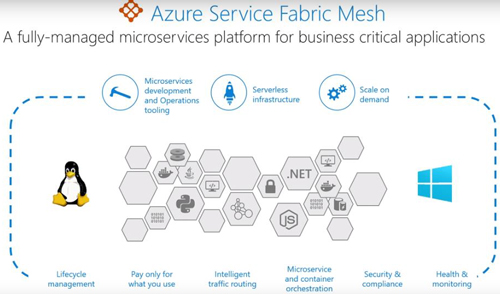News
Microsoft Issues Public Preview of Azure Service Fabric Mesh
- By Kurt Mackie
- July 18, 2018
Azure Service Fabric Mesh, a "serverless" means of hosting applications, is now available as a public preview, Microsoft announced this week.
The new public preview is currently available in U.S. East, U.S. West and Europe West Azure regions. It's free to use, although Microsoft plans to charge half-price "in the next few months" when Azure Service Fabric Mesh reaches "general availability."
Microsoft also announced this week that Service Fabric Mesh tools are now available for download in Visual Studio 2017. The new Service Fabric Mesh tools let developers describe Service Fabric applications using YAML, a "human readable data serialization language." YAML, a JSON superset, supposedly is easier to use than XML. The XML manifests used with Service Fabric were "complex and tedious," according to Microsoft's announcement.
During the public preview period of Azure Service Fabric Mesh, there are a few limitations. For instance, users can only run a maximum of five applications, and the largest container is "limited to 4 cores, 16-GB RAM," according to the announcement.
Azure Service Fabric Mesh is a serverless means of spinning up microservices applications or "cloud-native apps" using containers. Both Linux and Windows containers are supported. It lets developers put existing code onto Azure infrastructure and have Microsoft take care of the virtual machines and cluster management details.
The service can be used for so-called "mission-critical applications," since Azure Service Fabric Mesh automatically takes care of the infrastructure scale-up and scale-out needs of those apps. The scalability and availability of the service is supported by the use of clusters and Azure Availability Zones, according to Microsoft's "Overview" document. Azure Availability Zones, which began rolling out commercially in March, add application and data resiliency for Azure workloads.
IT consultancy Codit, an early tester of Azure Service Fabric, described Azure Service Fabric Mesh as "a true PaaS offering which allows you to run applications on top of Service Fabric without having to maintain the cluster beneath it." In contrast, the Azure Service Fabric service is more of a "Cluster Platform-as-a-Service (CPaaS) and is very similar to Azure Kubernetes Service, which gives me a managed Kubernetes cluster," per Codit's description.
The Azure Service Fabric service has been available for a couple of years, but it requires organizations to manage the virtual machines, according to Chacko Daniel, a principal program manager for Azure Service Fabric, in a Microsoft Channel 9 video. In contrast, the Azure Service Fabric Mesh takes care of various management details, such as container orchestration, routing, lifecycle management, compliance, security and monitoring, according to a slide presented by Daniel:
 [Click on image for larger view.] Azure Service Fabric Mesh capabilities. (Source: July 16 Microsoft Channel 9 video)
[Click on image for larger view.] Azure Service Fabric Mesh capabilities. (Source: July 16 Microsoft Channel 9 video)
Microsoft made the code for Azure Service Fabric open source a few months back, and while it's offered as a service from Azure, it can also be run on an organization's servers, if wanted, which is known as the "Service Fabric standalone on Windows Server" implementation. Microsoft is also planning a future standalone version of Azure Service Fabric using Ubuntu Linux, according to Madhan Arumugam Ramakrishnan, partner director of program management for Azure compute, in a May Redmond interview.
About the Author
Kurt Mackie is senior news producer for 1105 Media's Converge360 group.